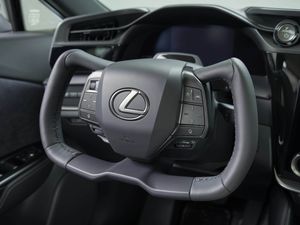Can Lexus reinvent the wheel?
Is Lexus’s new steering wheel going to make the impact Lexus hopes?

Of all the things that you might think strictly don’t need changing in a car, high up there has to be the shape of a steering wheel.
Pretty much since the birth of the automobile, there has been the idea that a steering wheel is round. Sure, Audi and a few others have explored the idea of a flat-bottomed steering wheel for a ‘sportier’ feel. But the basic premise of a circular shape has remained intact.
Until now, that is, when manufacturers are seemingly running out of ideas for ‘new’ things they can do to their cars, and are, well, trying to invent the wheel.
Tesla was the first, with its boss – and now Twitter CEO – Elon Musk devising the aircraft-like ‘yoke’ as the wheel for its new Model S and X (both are yet to be introduced in the UK). But it’s not just Tesla, as Lexus is now getting in on the action.

Given that Lexus is typically quite a straight-laced manufacturer, known for its conservatism and – generally speaking – older customer base, it is quite a surprise move. That said, the Japanese firm is keen to make an impact with its first bespoke electric car, the RZ, which is being released in the UK in early summer.
So that’s why it’ll be available with a new device known as ‘One Motion’, which will be offered as an option. It’s a steer-by-wire system, which works by the steering connecting electronically with the wheels, rather than using a mechanical connection.
The visual difference, however, is that it looks like someone has hacksawed away at a steering wheel, getting rid of the top and bottom to create this odd-shaped device. We shouldn’t really call it a wheel at all. It’s littered with buttons while there are stubby little indicator and wiper stalks attached to it. These features turn with it, rather than being fixed like a ‘normal’ steering wheel.
You might be wondering what on earth the point is, and we won’t pretend we didn’t think the same at first. The whole idea, Lexus says, is that it “requires less steering effort”. This is because the steering ratio changes depending on speed – not a new concept – but one that’s been exaggerated here.

Normally, when doing a sharp turn, or when parking, there would be a need to put lots of ‘lock’ on the wheel, but because of how it’s been designed, a small steering input has a big effect when it comes to the angle that the wheels turn. It means that lock-to-lock, it doesn’t even need one turn, and there’s no need to overlap your hands or shuffle them around. In contrast, a regular car with power steering normally needs 2.5 to 3.5 turns to go lock-to-lock.
But does it work? Well, surprisingly yes. At first, the experience is bizarre. It’s like jumping behind the wheel for the first time at 17. When negotiating a junction or mini roundabout, the feeling of hardly having to move the wheel to make a big turn is truly odd. But you learn to realise it’s a novel idea, and it means you can always leave two hands sensible positioned on the wheel, regardless of the manoeuvre. At higher speeds, the system really doesn’t feel much different to any other steering setup.
If you’ve got any doubts about the safety of the system – and the way it works electronically, specifically because this is an EV – it’s worth noting that Lexus has engineered a “fail-safe” provision, which can supply an emergency power supply that automatically engages should the system lose its power supply. Just the fact this has had to be considered is madness, it must be said.

The drawbacks? Well, we reckon it will take more than a test drive to understand how it works and appreciate the benefits. Many likely won’t get on with the shape and weird feeling of it at first, and it’s probably why few customers will actually end up choosing it. Lexus also hasn’t said how much it will cost as an option, but given the expense and effort that will have gone into its development, it’s unlikely to be cheap. The RZ isn’t a cheap car, it must be said, with prices starting from £62,500, rising to £72,500 for a top-spec model.
We also couldn’t get on with the indicators. Going around a roundabout, you find yourself spending time trying to find the stalks rather than concentrating on the road. There’s a sharp lip at the top of the wheel that’s quite unpleasant too, while the trim at the bottom of the ‘rim’ feels especially cheap.
This ‘One Motion’ wheel is still a few years away from being available on production cars, with Lexus only saying it will introduce it “by 2025”. Up until then the RZ will be supplied with a ‘normal’ setup. Has the wheel been reinvented? Well, the firm has given it a good go. But there are some things that don’t need changing. A steering wheel is one of them.





